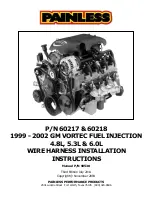
Operating media
Lubricating oil
34
© 2007
4
General
Modern diesel engines place very high demands on
the lubricating oil to be used. The specific engine
performances which have increased constantly over
the last few years lead to an increased thermal load
on the lubricating oil. The lubricating oil is also more
exposed to contamination due to reduced oil com-
sumption and longer oil change intervals. For this
reason it is necessary to observe the requirements
and recommendations described in this operating
manual in order not to shorten the life of the engine.
Lubricating oils always consist of a base oil and an
additive package. The most important tasks of a lu-
bricating oil (e.g. wear protection, corrosion protec-
tion, neutralisation of acids from combustion
products, prevention of coke and soot deposits on
the engine parts) are assumed by the additives. The
properties of the base oil are also decisive for the
quality of the product, e.g. with regard to thermal
load capacity.
In principle, all engine oils of the same specification
can be mixed. However, mixing of engine oils should
be avoided because the worst properties of the mix-
ture are always dominant.
The
lubricating oil quality
has a considerable influ-
ence on the life, performance and thus also on the
costs-effectiveness of the engine. It basically applies
that: The better the lubricating oil quality, the better
these properties.
The
lubricating oil viscosity
describes the flow be-
haviour of the lubricating oil depending on the tem-
perature. The lubricating oil viscosity has no
influence and effect on the lubricating oil quality.
Synthetic lubricating oils
are used increasingly
and have advantages. These oils have a better tem-
perature and oxidation stability as well as a relatively
low cold viscosity. Since some processes relevant to
the definition of the lube oil change intervals are not
essentially dependent on the lube oil quality (such as
the incorporation of soot and other contaminations),
the lube oil change interval when using synthetic
lube oils may not be increased in relation to the spec-
ifications of the lube oil change intervals.
Biodegradable lubricating oils
may be used in
DEUTZ engines if they meet the requirements of this
operating manual.
Quality
Lubricating oils are classified by DEUTZ according
to their efficiency and quality class (DQC: DEUTZ
Quality Class). It basically applies that: with increas-
ing quality class (DQC I, II, III, IV) the lubricating oils
are more efficient and higher quality. The appended
quality class designation (- 02 / - 05) indicates in
which year the classification was made.
Lubricating oils according to other comparable spec-
ifications can be used as long as they meet DEUTZ
requirements. In regions in which none of these
qualities are available, please contact your responsi-
ble DEUTZ partner.
The following lubricating oils are specified for the en-
gines described in this operating manual.
With open crankcase breather:
DQC II - 05
DQC III - 05
DQC IV - 05
With closed crankcase breather:
DQC III - 05
DQC IV - 05
Recommended quality class
DEUTZ
ACEA
API
DQC II - 05
E3-96 / E5-02 /
E7-04
CG-4 / CH4 / C I-
4
DQC III - 05 See TR 0199-99-3002
Please contact your DEUTZ partner
DQC IV - 05
OBJ_DOKU-12638-001.fm Seite 34 Mittwoch, 22. August 2007 9:25 09
















































